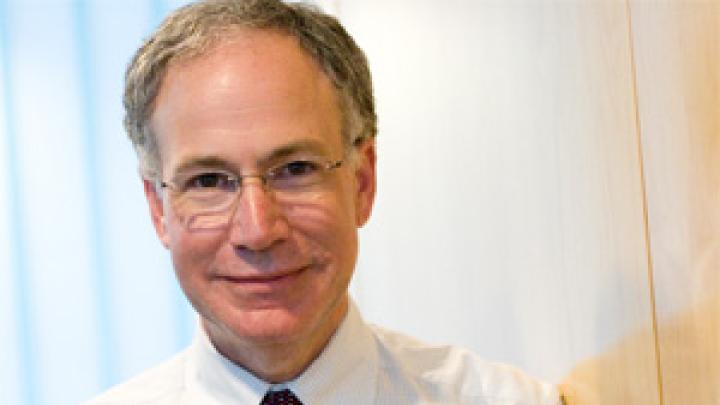Allan M. Brandt has been appointed dean of the Graduate School of Arts and Sciences (GSAS), within the Faculty of Arts and Sciences (FAS). A professor of the history of science in FAS, Brandt holds a joint appointment as Kass professor of the history of medicine within the Harvard Medical School (HMS) department of social medicine. The pending appointment, word of which became known informally, subsequently leaked to the Harvard Crimson, which published a story on its website early on the morning of December 12; as a result, the official announcement of the appointment was accelerated (see the University news release).
Brandt will succeed Theda Skocpol, Thomas professor of government and sociology, who became dean in 2005 but announced her intention to step down last spring. Skocpol made her final report to the faculty at an FAS meeting on Tuesday afternoon, December 11; in it she highlighted forthcoming increases in financial support for doctoral students in the social sciences and humanities, and the availability of new funds that will enable Harvard to admit more graduate students in the sciences and in engineering across the University. (A fuller report on those developments, and on Skocpol’s tenure, will be forthcoming soon on line and in the March-April issue of Harvard Magazine.)
Brandt served as chair of the history of science department during the 2000-2001 through 2005-2006 academic years. That administrative experience, his dual appointments in FAS and HMS, and the nature of his academic work should all serve him well in his new GSAS responsibilities. As Skocpol noted, the deanship is neither organizationally powerful nor equipped on its own with the kinds of financial resources available to the deans of Harvard’s separate faculties. But it affords access to exciting research, faculty members, and graduate students across the University, because GSAS is the steward of all of Harvard’s Ph.D. programs, many of which now cross disciplinary and school boundaries (see www.gsas.harvard.edu/programs_of_study/programs_of_study.php for the current fields of offerings).
Trained as an historian (he was a Brandeis undergraduate, and earned a Ph.D. in American history from Columbia in 1983), Brandt taught at Harvard from 1982 to 1990, and then returned in 1992. He has written on the social and ethical aspects of health, disease, and medical practice, focusing on twentieth-century America. No Magic Bullet explored venereal disease in the United States. He also edited Morality and Health with Paul Rozin, an interdisciplinary approach to moral questions of health and disease. His most recent book, The Cigarette Century: The Rise, Fall, and Deadly Persistence of the Product That Defined America, examined the tobacco industry (see “The Fall of the House of Ashes? July-August 1996, page 19, for an account of the research in progress). The book was awarded the Albert J. Beveridge Prize by the American Historical Association and the Arthur Viseltear Prize of the American Public Health Association. On his website for the book, Brandt wrote, “We now confront a worldwide pandemic of tobacco-related diseases as cigarette use has spread.…It is my hope that The Cigarette Century provides a strong foundation for a critical discussion of new strategies to avert a potential global health disaster.”
As a scholar, Brandt has been involved in graduate training at the master’s and doctoral level within both FAS and HMS; the Ph.D. programs of the latter are offered through FAS’s departments of anthropology and history of science. In 2005, he was appointed director of a new social-sciences track in the joint M.D.-Ph.D. program, combining work in anthropology, health policy, government, or psychology with clinical medicine (www.hms.harvard.edu/md_phd/program/sstrack.htm). In earlier faculty discussions concerning revision of the undergraduate curriculum, Brandt urged broad perspectives on how faculties from other Harvard schools might be involved in education in the College, and advocated a holistic assessment of students’ classroom work, extracurricular activities, and study abroad. He has also served as the director of the Collection of Historical Scientific Instruments (see “Telltale Apparatus,” March-April 2006, page 42).
In a statement made as part of the official announcement, FAS dean Michael D. Smith said, “Allan is an exceptional scholar and teache who will bring to the position a deep understanding of the complex issues facing the graduate school.” He cited Brandt’s dual appointments and said, “[H]is service on committees, experience as a department chair, and his service as the director of the social-sciences track of the M.D./Ph.D. program give him a unique background on which to draw when looking broadly at our graduate programs, both within the FAS and jointly with the other schools. With creative energy, enthusiasm, and a collaborative spirit, Allan will continue to move us forward in the areas of teaching, training, and funding for graduate students in our many graduate programs, long-standing and new alike.”
As a teacher, Brandt has offered a popular undergraduate Core course, Historical Study A-34, “Medicine and Society in America,” and a freshman seminar on “The Tobacco Pandemic: History, Culture, Science, and Policy.” He has also offered a research seminar on the history of medical ethics, in the history of science department.
Brandt has been on leave during the current academic year. He assumes his duties as GSAS dean on January 1.








